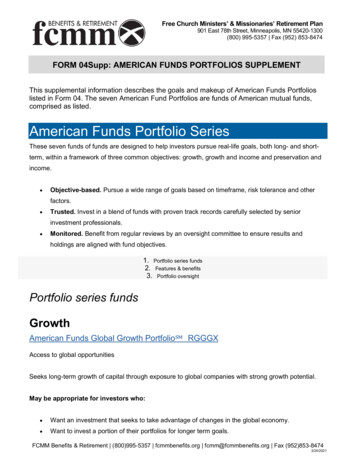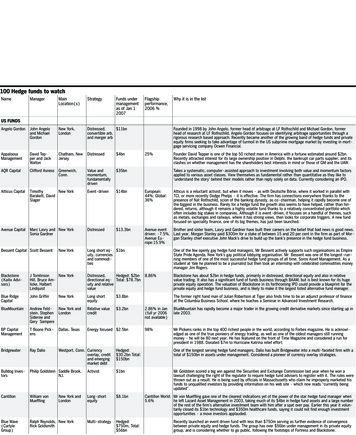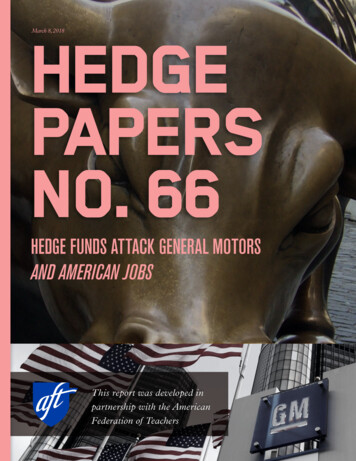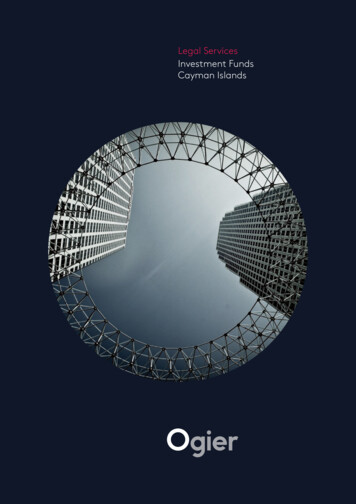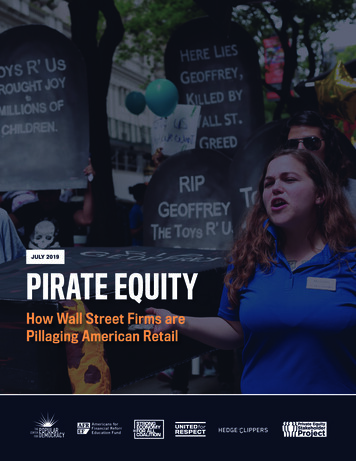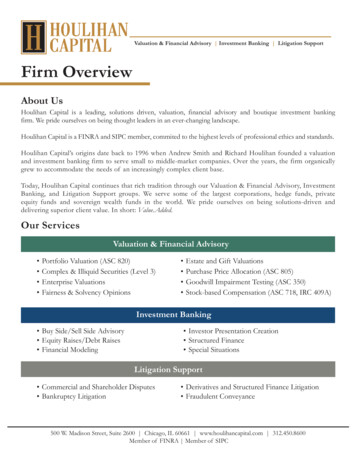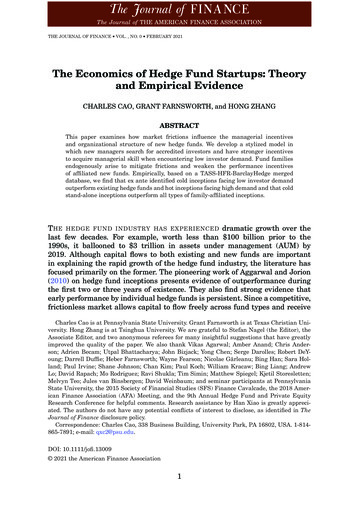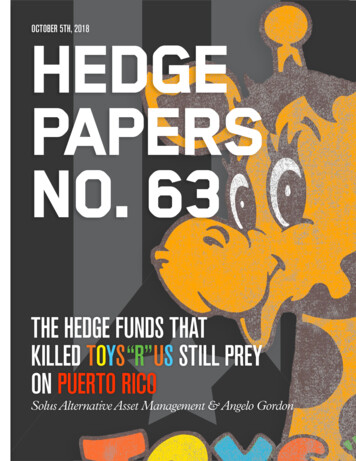
Transcription
OCTOBER 5TH, 2018HEDGEPAPERSNo. 63THE HEDGE FUNDS THATKILLED TOYS“R”US STILL PREYON PUERTO RICOSolus Alternative Asset Management & Angelo Gordon
Hedge funds, Solus Alternative Asset Management andAngelo Gordon, use extremely short-sighted strategies in orderto score payouts for themselves and their investors. Andwhether they are forcing Toys'R'Us to shut down or extractingprofit from a Puerto Rico in crisis, the people payingfor their profits are the people who need that money most.CONTENTS3 Introduction5 Solus & Angelo Gordon7 Shutting Down Toys'R'Us for Profit– Worker Spotlight: Jose Silva9 Extracting Profit from a Puerto Rico in Crisis– Worker Spotlight: Madilyn Muniz13 Where the Vulture Profits Go16 What Solus & Angelo Gordon Need To Do forToys'R'Us Workers and Puerto Rico17 Who Are the Hedge Clippers18 Press General Inquiry Contacts
INTRODUCTIONThe hedge funds that forcedToys‘R’ Us to shut down andthrew tens of thousands ofworkers out of their jobs haveplayed a similarly destructiverole in Puerto Rico, speculatingon government-issued debtand using aggressive tactics topursue massive profits at thedirect expense of Puerto Ricans.Hedge funds, Solus Alternative Asset Managementand Angelo Gordon, use extremely short-sightedstrategies in order to score payouts for themselvesand their investors. And whether they are forcingToys R Us to shut down or extracting profit from aPuerto Rico in crisis, the people paying for theirprofits are the people who need that money most.Solus and Angelo Gordon, on the other hand, hardlyneed the money. Solus manages 8 billion in assets,and Angelo Gordon manages 23 billion.1 Even amodest year of returns likely translates into tens ofmillions of dollars in earnings for the firms’ CEOs,Christopher Pucillo of Solus and Michael Gordon ofAngelo Gordon. Both lead lavish lifestyles—withmassive estates and vacation homes in rarefiedlocales like Jupiter, FL, Telluride, CO, and GreatBarrington, MA.On the other end of these deals are people forwhom these dollars would pay for basic necessities:Toys R Us workers who were unceremoniouslylaid off without severance, and Puerto Ricans whoare seeing massive cuts to essential services likeeducation and healthcare and still recovering fromthe devastation caused by Hurricane Maria.The people suffering these consequences are, insome cases, one and the same: Toys R Us workerswho were at stores in Puerto Rico or who had leftthe island in search of better economic prospects,in some cases in the wake of Hurricane Maria.While it might be too late to save Toys R Us, thesehedge funds can still choose to give up a percentageof their profits to ensure the workers whose lives theyhave turned upside down receive some kind of relief.In the case of Puerto Rico, both hedge funds shouldcancel the debt they hold, completely—afterHurricane Maria, in the middle of a deep economiccrisis, no dollars should be transferred away fromfunding essential services on the island into thepockets of vulture speculators like Christopher Pucilloand Angelo Gordon.1 ngs/587624 Top200Managers.pdfOctober 2018 — Hedge Papers No. 633
NOTE: This report includes profiles of former Toys“R” Us workers from across the Puerto Ricandiaspora and their stories of how hedge fund attackson Toys “R” Us and Puerto Rico have hurt them,theirfamilies and their communities.October 2018 — Hedge Papers No. 634
SOLUS & ANGELO GORDONSolus Alternative Asset Managementand Angelo Gordon both embraceclassic vulture strategies, buying upthe debt of faltering companies on thecheap and using financial and legalmaneuvers to extract value – in somecases by forcing companies throughbankruptcy and liquidation.example of a major success, noting that the processcleaned up the company’s balance sheet, settledsome “union issues,” and sent the stock soaring. Thatbankruptcy, like many bankruptcies, was widely seenas a union-busting tool; the unions eventually threwtheir support behind the US Airways merger in orderto escape draconian cuts in the bankruptcy process.4Solus spelled out this strategy in a 2012 presentation,highlighting the advantages of liquidations.2 “Unliketraditional distressed opportunities,” the presentationargued in Wall Street-speak, “liquidations removevaluation and process risks.” Bar charts in thepresentation show the additional value that can beextracted through liquidation. The presentationhighlighted the hedge fund’s “extensive experience inevaluating complex liquidations.”Solus CEO Christopher Pucillo elaborated on thisstrategy in an interview with Pensions & Investments,where he said that the company had set up “specialproducts” focused on “liquidating bankruptcyassets.”3 In the interview, he hailed his hedge fund’sinvolvement in the American Airlines bankruptcy andits subsequent merger with US Airways as anPucillo has headed Solus since 2007, when it wasspun out of Stanfield Capital Partners. Previously, hewas head of high yield loan trading at Morgan Stanley.Angelo Gordon also has a major focus on vulturestrategies, which are often included under theeuphemistic label of “distressed debt” investing. Itswebsite notes that “Distressed debt investing has2 ds/2012/09/Christopher-Pucillo-Solus.pdf3 http://video.pionline.com/media/Solus%27 Pucillo discusses distressed investing/0 a1x38ccj/04 http://inthesetimes.com/working/entry/13786/labor tension rising at american airlines as bankruptcy judge oks union busOctober 2018 — Hedge Papers No. 635
been a core Angelo Gordon investment strategysince the firm’s inception.”5 The firm was founded in1988 by the late John M. Angelo and Michael L.Gordon. Gordon is still CEO and CIO of the firm.Angelo and Gordon were executives at L.F.Rothschild prior to founding the hedge fund in 1988.Fittingly, they left the company shortly before it filedfor bankruptcy and shut down.clients. For example, New York City’s pension fund isan investor, and Angelo Gordon had even hired itsformer head, Larry Schloss, as an executive in 2013.12One of the hedge fund’s more notable vulture playswas its 2009 investment in FairPoint, an internetprovider and phone service company based in NorthCarolina. Fairpoint’s 2007 acquisition of Verizon’sbusiness in Maine, New Hampshire, and Vermont for 2.72 billion had backfired, and the company’s debtload had become unsustainable.6 As it faltered anddeclared bankruptcy in October 2009, Angelo Gordonbought up the company’s senior secured debt, amove which would eventually make it the company’sbiggest shareholder.7The company emerged from bankruptcy on January2011.8 With Angelo Gordon as its largest shareholder,the company began an aggressive campaign againstits workers, cutting health benefits and freezingpensions.9 The workers fought back by going onstrike, at one point picketing a meeting of the boardof trustees of Colby College, where Michael Gordonholds a seat.10 The four-month strike—the longest inthe telecommunications industry in decades—endedin February of 2015, when the unions ratified anew contract.11It is ironic that Angelo Gordon wanted to eliminatethe pensions of FairPoint’s workers, because itcounts numerous public workers’ pension funds ispute,Gordon is also a member of the board of directors of Damon Runyon Cancer Research lternatives.com/node/24985October 2018 — Hedge Papers No. 636
SHUTTING DOWNTOYS 'R' US FOR PROFITAfter declaring bankruptcy last year,Toys R Us could have undergone are-organization that would havepreserved the iconic company and itsoperations. Instead, a group of fivehedge fund creditors with a strongenough investment position tocontrol the company’s future decidedthat they could squeeze more profitout of their investments if they forcedit to shut down and sell off its assets.The group of hedge funds was led by SolusAlternative Asset Management, which had built up alarge position in a layer of secured Toys R Us debtthat gave it a powerful negotiating position, becauseowners of it had put up collateral for bankruptcyfinancing.13 As of June 2018, Solus owned 221million of the 1 billion in B4 debt issued, a position ithad built up over the course of the bankruptcy. Theprice of the debt fell over the course of thebankruptcy proceeding, trading below 40 cents onthe dollar, at one point, then rebounded when thecompany announced it was liquidating (it was sellingwell above 50 cents on the dollar, as of August).14Toys R Us leadership had been searching for ways tosave the company, and developing plans for reorganization. But to buy themselves time to put a plan inplace, they needed to secure a waiver of cash flowforecast requirements from the B4 creditors. Thecompany received one two-month waiver in January,but B4 creditors, led by Solus, declined to offer anextension beyond one week, and under conditionsthat would have spelled doom for the company –requiring it not to pay vendors or landlords.At that point, Toys R Us decided that it had to shut down.33,000 workers were laid off, without severance.Solus built up the largest stake in B4 debt and ledthe strategy that led to the liquidation. But it was notalone in pursuing the company’s destruction.Angelo Gordon acted as a sort of lieutenant in thetrade, recently joining Solus in penning a letter toToys R Us workers telling them that they would donothing to help them secure severancein the wake ofthe liquidation.Lawyers for the hedge funds wrote that “we do notbelieve there is a sound basis to claim that Toys “R” Us13 hint-it-wasnt-only-amazon-153503440114 See price chart: hint-it-wasnt-only-amazon-1535034401October 2018 — Hedge Papers No. 637
secured lenders should make additional financialcontributions for the benefit of employees or otherunsecured lenders” – essentially telling workers thatbecause they did not own the correct financialinstrument, they had no right to pay.15TOYS ''R'' US WORKER SPOTLIGHTJose SilvaPORT ST. LUCIE, FLTwo other hedge funds, Highland Capital andOaktree Capital, along with a mutual fund, FranklinMutual, had previously joined Solus and AngeloGordon as B4 creditors pushing for liquidation.I grew up in San Juan, Puerto Rico in a 500 square footapartment with my mom and sister. My mom worked hard, butonly earned 7.25 an hour to support my sister, me, and mygrandparents. Times were really tough for us. We lived throughgovernment shutdowns. I lost classmates to violence. Therewas desperation all around us.I was 19 when my mom, my sister and I left the island. Like somany before me and most of my own family members, we didn’twant to leave but we had to. We wanted a safer, more stablelife. All we wanted was the opportunity to work hard and raiseour families.I found that opportunity in retail, but it hasn’t been easy. Iworked my way up while taking on seasonal work. ThenI landed at Toys “R” Us 4 years ago. I was transferred from storeto store, including the international store in Puerto Rico, whereI worked for 2 years. It was strange returning to Puerto Rico,and sadder to see that so many problems were unchanged.When I worked at the largest Toys R Us store on the island andfound a community with my team members throughout myyears at Toys “R” Us. I met my wife through working at Toys “R”Us. Today we have a 9 month old and another one on the way.I was on a conference call with other managers when I foundout the company was liquidating. I was heartbroken. My wifeand I had just had our baby daughter and were looking forwardto raising our family in our Toys “R” Us community. I ended upworking all the way to the end of the liquidation and closed 2stores, during which I saw this company and community webuilt up being torn apart and the workers treated like garbage.Working at Toys “R” Us gave me the ability to work towardstability after Puerto Rico, but it was taken from me by thesame Wall Street vultures that caused so much destruction onmy island that forced my family to leave in the first place. Theyowe me and my family. They owe 33,000 Toys “R” Us familiesand so many more in Puerto Rico and in the diaspora.15 r-severanceOctober 2018 — Hedge Papers No. 638
EXTRACTING PROFIT FROM APUERTO RICO IN CRISISSolus & Angelo Gordon do not justprey on companies in crisis – they alsoturn these speculative tactics againstthe people of Puerto Rico. Both hedgefunds bought up large portions ofPuerto Rico’s debt at low prices in theinterest of extracting high payouts onit. Money that could be paying for ajust recovery and essential services,such as healthcare and education, willinstead line their pockets.SOLUSSolus Alternative Asset Management has flownunder the radar in Puerto Rico’s restructuring, but infact has played an aggressive role around twosignificant pieces of the debt: debt issued by theGovernment Development Bank (GDB) andunsecured loans to PREPA, the power authority.Solus has been part of a the group of hedge fundsspeculating on debt issued by the GovernmentDevelopment Bank, using aggressive legalstrategies to pursue payment on the debt. Solus wasfirst reported to be part of the “Ad Hoc Group” ofhedge funds negotiating with the GovernmentDevelopment Bank in 2015. The group also includedFir Tree Partners, Brigade Capital Management,Claren Road Asset Management, and Fore Research& Management. Though the exact amount of GDBdebt owned by Solus is unknown, as of 2016 the groupof hedge funds claimed to own close to a quarterof the 4.1 billion in GDB debt, around 935 million.Solus played hardball. In April 2016, it and several ofthese hedge funds filed suit in federal court tocompel the GDB to freeze deposits in order toprotect their payments. The hedge funds withdrewtheir request for a temporary restraining order shortlythereafter, following an executive order barringnon-essential transfers out of the GDB. The nextmonth, they reached a preliminary deal with the GDBaround debt repayment, but again filed suit followingthe amendment of the Puerto Rico EmergencyMoratorium and Financial Rehabilitation Act, whichwould have prioritized the rights of depositoryfinancial institutions such as credit unions over hedgefund vultures.In 2017 and 2018, Solus has continued to be part ofthe group of hedge funds negotiating restructuringagreements with the GDB under Title VI, the voluntary,out-of-court process provided for under PROMESA(The Puerto Rico Oversight, Management, andEconomic Stability Act). As of September 2018, thedeal has been approved by creditors and is supposedto pay out 55 cents on the dollar for GDB debt thatwas once trading as low as 12 cents on the dollar.October 2018 — Hedge Papers No. 639
[Image: Cover page of the GDB Solicitation Statement]October 2018 — Hedge Papers No. 6310
Solus is also the largest unsecured creditor ofPREPA (Puerto Rico Electric Power Authority),holding 284 million in unpaid principal of fuel lineloans as of February 1, 2018.16 Fuel line loans arelines of credit extended to PREPA to allow it topurchase fuel. Solus appears to have first assumedthe role in 2015, when the hedge fund purchased a 146 million unsecured fuel line loan from Citigroup.The loans are unsecured, but Solus and Scotiabank– the other main fuel line lender – have arguedthat the loans are senior to other forms of PREPAdebt, due to the seniority guaranteed by theoriginal agreements.But it was after Puerto Rico’s debt started to spiralout of control that Angelo Gordon began buyingup debt and pressing its case for payment. Theaggressive campaign started in 2015.ANGELO GORDONAngelo Gordon’s relationship with President Trump isbroader. The hedge fund manages some of hisinvestments through two funds, AG Diversified CreditStrategies Fund LP and AG Eleven Partners LP, asreported in Trump’s financial disclosures.21Interestingly, AG Eleven Partners was one of thesignatories of the forbearance agreement betweenPREPA and its creditors in 2015, meaning it hadinvestments in PREPA’s bonds.22Angelo Gordon has also been speculating on PuertoRico’s debt. The hedge fund is part of the Ad HocGroup of PREPA Bondholders, a group of investmentfirms that hold approximately 2.9 billion inaggregate principal amount of uninsured PREPAbonds. As of September 11, 2018, Angelo Gordonowned 207,742,716 in uninsured PREPA debt and 165,000 in Commonwealth debt.17 The hedge fundhad previously reported 321,932,716 in uninsuredPREPA debt in documents filed in federal court, andappears to have begun unwinding its position inAugust 2018.Angelo Gordon hired law and lobbying firm Venableto stop H.R. 870, the Puerto Rico Chapter 9 UniformityAct of 2015, a bill sponsored by then residentcommissioner Pedro Pierluisi to include Puerto Ricoin Chapter 9 bankruptcy.19 One of those lobbyistswas Andrew Olmem, who was appointed by presidentTrump as his special assistant for financial policy.Last year he was granted an ethics waiver bythe White House, allowing him to meet with hedgefunds involved in Puerto Rico’s debt crisis, includingAngelo Gordon.20Apparently, Angelo Gordon’s interest in Puerto Ricogoes back to 2006, when it became one of the topcontributors to then resident commissioner Luis Fortuño,as reported by the Center for Responsive puertorico/Home-DownloadPDF?id1 NzE2MjY4&id2 0See Fourth Verified Statement: oadPDF?id1 ODk2MDk1&id2 ontributors?cycle 2006&cid .php?id se.gov/files/ANDREW%20OLMEM.PDF ;He is now deputy director of domestic policy on the National Economic -deputies-to-kudlow21 2015: nald-Trump-2015-Financial-Disclosure.html ,2016: ump-2016-Financial-Disclosure.html ,2017: ump-Financial-Disclosure-2017.html22 rberanceAmendmentEXECUTED.pdfOctober 2018 — Hedge Papers No. 6311
Days after Hurricane Maria hit Puerto Rico, whenresidents were struggling to survive withoutelectricity and water, the Ad Hoc Group of PREPABondholders, including Angelo Gordon, offered thebeleaguered government 1.85 billion in new loans.TOYS ''R'' US WORKER SPOTLIGHTMadilyn MunizBRONX, NYIn other words, their first reaction to the disaster wasto propose that the government to take on more debt.The offering was structured in two parts, 1 billion ina so-called debtor-in-possession (DIP) loan, a lowrisk loan for institutions under bankruptcy protection,and an interchange of 1 billion of existing bonds foranother 850 million DIP note, meaning there was a 150 million debt cut. As reported by The Intercept:“DIP financing, typically done for bankrupt entities, isconsidered low-risk because it puts the creditor in asenior position to get paid back in full. By swappingPREPA bonds, which are junior to other forms ofPuerto Rican debt, with DIP loans, the bondholderswould put themselves in a better position forrepayment. They are more valuable bonds to hold.”23Recently, on July 30, 2018, Angelo Gordon was one ofthe signatories to the preliminary restructuringagreement of PREPA.24 This deal, as it is, imposesa “transition charge”, a sort of regressive tax thatincreases over time with the sole purpose ofpaying the electrical authority’s debt. If it becomesfinal, Puerto Ricans will be required to pay offPREPA’s debt for the next 40 years.Notably, Solus and Angelo Gordon are not the onlyToys R Us vulture funds that have set their sights onPuerto Rico – Franklin and Oaktree are alsospeculating on various components of the island’s debt.I worked at the Toys “R” Us store on Bruckner Ave. in the Bronxfor almost 20 years. In those two decades, I was divorced,became a single mother, and raised my two children on what Ibrought home. I also moved my parents in with me from PuertoRico a few years ago and cared for my father until we lost himto cancer. Toys “R” Us was more than a job. It gave me theability to raise my kids and support my parents, and the flexibilityto take my father to chemo appointments and be with himthrough the end of his life. I found my second family in thecommunity of women – many also from the island – that Iworked with at Toys “R” Us, and we supported each otherthrough the ups and downs in our lives.I lost all of that on June 30. I was able to get a part-time job atBurlington Coat Factory across the street from my Toys “R” Usstore, but it is not enough to cover even the basics. It is soexpensive to live in New York. I am scrambling between my job,caring for my elderly mother at home, looking for a second joband making multiple trips to the social services office andjumping through all these hoops just to get public assistancefor my family.I was ignorant of what was really happening on the island. Ithought it was the government but it’s really these Wall Streetfirms involved. We’re all Americans and these are facts of whathappened.These Wall Street vulture hedge funds are making it impossiblefor all of us to survive – either in Puerto Rico or here in theBronx. I sometimes find it hard to believe that they’re right herein Manhattan, because it feels like we’re living in completelydifferent worlds. They don’t know the New York I know. They’renot going through what I am just to just put food on the table.Things have to change and we can’t just accept that corporateinterests should run our lives.23 ffering-puerto-rico-more-debt/24 .pdfOctober 2018 — Hedge Papers No. 6312
WHERE THEVULTURE PROFITS GOThe profits that Solus and AngeloGordon extract from these sortsof vulture trades are substantial andwill ultimately be put to someof the least productive uses imaginable– augmenting the already excessivewealth and luxury lifestyles oftheir executives.SOLUSIn late August 2018, for instance – shortly after Solusand Angelo Gordon told Toys R Us workers that theyowed them no severance – Solus CEO ChristopherPucillo purchased a vacation home in Jupiter, FL for 7.5 million.25 It looks out on the Atlantic Ocean onone side and the Indian River on the other, with 100feet of frontage on each side. The property boasts 4bedrooms, five baths, an elevator, a pool, and a dockthat can accommodate a “large yacht,” according to abrochure for the property.26 The brochure also saysthat it was “completely renovated with a chiccontemporary style,” though the style might moreaccurately be described as ostentatious, withall-white decor, gold fixtures, and life-sized dogsculptures in the living room.Pucillo also owns a 5,000 square foot home inSummit, NJ that he purchased for 3.75 million in2015, and a 4.8 million vacation home in Telluride,CO that has 8 bedrooms and 9 baths.27 He and otherSolus executives also purchased a set of threecondos in Telluride for 3.9 million in 2015.2825 entAndInfoByBookPage?Key Assessor&booktype O&booknumber 3013&pagenumber 22926 Jupiter-FL-33469/45683035 zpid/;Brochure: re-607SBeach.pdf27 Search here for Pacstreet House under “Owner” to pull up the info for the property: http://sanmiguel.infoenvoy.com28 Property info: 290-S-Townsend-St-Units-1-2 Telluride CO 81435M10423-77494#photo18Power of atty: http://www.thecountyrecorder.com/Image.aspx?DK 420547&PN 1Sale: http://www.thecountyrecorder.com/Image.aspx?DK 420548&PN 1October 2018 — Hedge Papers No. 6313
Pucillo recently also joined the board of the TellurideFoundation, a regional charitable foundation with ahigh-powered board that includes several hedge fundand private equity executives. According to an articleon the foundation’s website, Pucillo, his wife, and histhree daughters have spent every Christmas andnearly every Fourth of July in Telluride since 2006, andthe family belongs to the Telluride Ski and Golf Club.29Pucillo is able to pay for it all because he likely rakesin tens of millions of dollars even when his hedgefund has an average year. Though his compensationand net worth are not publicly disclosed, he owns a25%-50% stake in the firm.30 With 8 billion inassets under management and hefty managementand performance fees, the above properties are likelya relatively small percentage of his overall net worth.Notably, Pucillo and other Solus executives are notthe only ones benefiting from these vultureinvestments. The Blackstone Group, the privateequity firm, owns between 10% and 25% of Solus,31and also happens to be playing a vulture role inPuerto Rico: it owns a mortgage company, Finance ofAmerica, that has been aggressive in foreclosing onPuerto Rican homeowners.32 (Blackstone executiveJ Tomilson Hill sits on the Telluride Foundation boardalongside Pucillo.)Some of Solus’ key investors are pension funds, suchas the San Francisco Employees Retirement System( 300 million) and the New Jersey Division ofInvestment ( 376 million). In other words, workers’retirement funds are being invested in a hedge fundwhose primary strategy is pursuing the liquidation ofassets and the destruction of jobs.Other investors who will reap the spoils of Solus’vulture plays on Toys R Us and Puerto Rico includeAnthony Scaramucci’s SkyBridge Capital and NewEngland Patriots owner Bob Kraft’s Kraft FamilyFoundation. In an exchange with the Private EquityStakeholder Project, Scaramucci said that he hasencouraged Solus to support Toys R Us workers.33ANGELO GORDONAngelo Gordon CEO Michael Gordon is probablyeven wealthier than Pucillo. A trust in his name ownsbetween 25% and 50% of Angelo Gordon, whichmanages 23 billion in assets.34Gordon owns an apartment at 1080 Fifth Avenue,35where units routinely sell for millions of dollars, a hotelunit in the Trump International at 1 Central Park West,3629 member-chris-pucillo30 orm/adv/Sections/iapd AdvScheduleASection.aspx?ORGPK 144155&FLNG PK 36The hedge fund’s brochure discloses annual fees of 1.5-2% on assets (management fee) and 15-20% on returns(performance fee). If the 8 billion hedge fund returned a middling 5% in a given year, we estimate that the management andperformance fees would generate income of around 180 million, assuming fees of 1.5% and 15%. Part of this income wouldbe used to cover costs, such as compensation for the firm’s 55 employees. After those costs are covered, Pucillo, with his25-50% stake, would likely receive a large share of what remains, depending on how profits are distributed. The brochuredetailing fees is Common/crd iapd Brochure.aspx?BRCHR VRSN ID /viewform/adv/Sections/iapd AdvScheduleASection.aspx?ORGPK 144155&FLNG PK s/The Michael Gordon 2011 Revocable Trust owns 25-50% of Angelo t/viewform/adv/Sections/iapd AdvScheduleASection.aspx?ORGPK 131940&FLNG PK ssessmvh.jsp?statementId S/DocumentSearch/DocumentImageView?doc id FT 1430005486943October 2018 — Hedge Papers No. 6314
and two homes in Great Barrington, MA – a 10-acreestate with a pool and a smaller home on a nearbypond.37 Gordon is also a major donor to ColbyCollege, where he sits on the board of trustees.Another 25-50% of Angelo Gordon is owned by JudyHart Angelo, the widow of the late Angelo Gordonco-founder John Angelo. She is a singer andsongwriter most well known for co-writing the Cheerstheme song, “Where Everybody Knows YourName.”38 She owns an 8-acre, 7.6 million estate inLong Branch, NJ,39 as well as an apartment at theDakota which she and her late husband purchasedfor 3.25 million.40Angelo Gordon’s investors include numerous publicpension funds, including the New York StateCommon Retirement Fund, the New Jersey Divisionof Investment, the Massachusetts Pension ReservesInvestment Trust, and the North Carolina RetirementSystems. As is the case with Solus, workers’retirement funds are being used to fund destructiveattacks on working people.37 Navigate to and open information for 352
October 2018 — Hedge Papers No. 63 6 been a core Angelo Gordon investment strategy since the firm’s inception.”5 The firm was founded in 1988 by the late John M. Angelo and Michael L. Gordon. Gordon is still CEO and CIO of the firm. Angelo and Gordon were executives at L.F. Rothschild p
